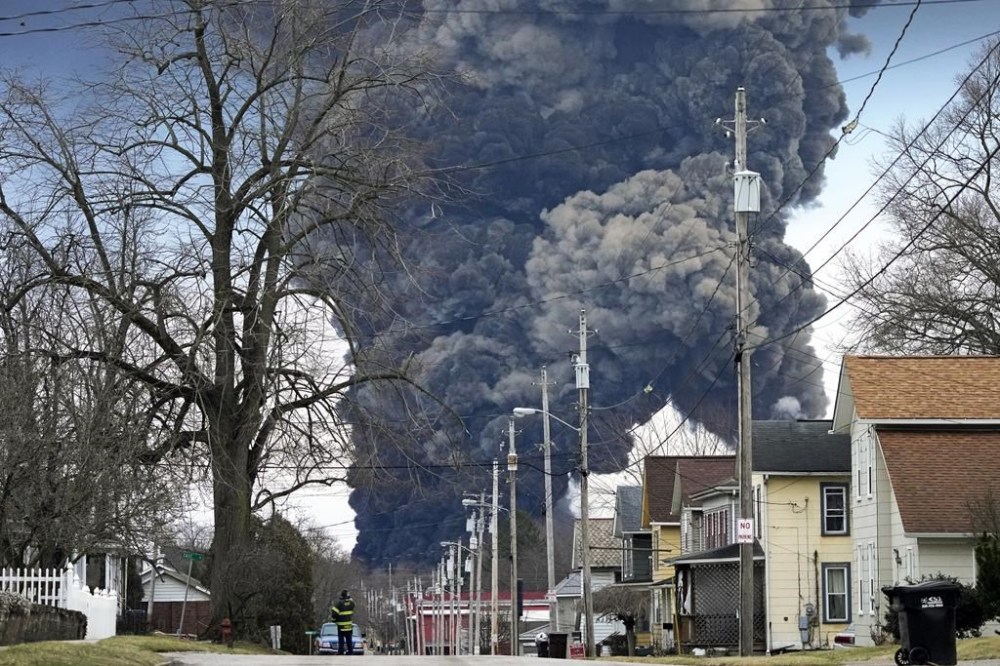IRS decides people who got money from Norfolk Southern after Ohio derailment won’t be taxed on it
Advertisement
Read this article for free:
or
Already have an account? Log in here »
To continue reading, please subscribe:
Monthly Digital Subscription
$1 per week for 24 weeks*
- Enjoy unlimited reading on winnipegfreepress.com
- Read the E-Edition, our digital replica newspaper
- Access News Break, our award-winning app
- Play interactive puzzles
*Billed as $4.00 plus GST every four weeks. After 24 weeks, price increases to the regular rate of $19.00 plus GST every four weeks. Offer available to new and qualified returning subscribers only. Cancel any time.
Monthly Digital Subscription
$4.75/week*
- Enjoy unlimited reading on winnipegfreepress.com
- Read the E-Edition, our digital replica newspaper
- Access News Break, our award-winning app
- Play interactive puzzles
*Billed as $19 plus GST every four weeks. Cancel any time.
To continue reading, please subscribe:
Add Free Press access to your Brandon Sun subscription for only an additional
$1 for the first 4 weeks*
*Your next subscription payment will increase by $1.00 and you will be charged $16.99 plus GST for four weeks. After four weeks, your payment will increase to $23.99 plus GST every four weeks.
Read unlimited articles for free today:
or
Already have an account? Log in here »
Hey there, time traveller!
This article was published 05/06/2024 (511 days ago), so information in it may no longer be current.
Most people who received money from Norfolk Southern in the wake of last year’s fiery train derailment in eastern Ohio won’t have to pay taxes on millions of dollars in aid payments after all.
The Internal Revenue Service said Wednesday that most of the payments people who live near East Palestine, Ohio, received to help them pay for temporary housing or replace their belongings aren’t taxable because the Feb. 3, 2023, derailment that forced thousands of people to evacuate their homes qualified as “an event of a catastrophic nature.”
The railroad estimates that it has paid more than $21 million to residents after the derailment as part of more than $107 million in assistance it has offered to the communities affected by the catastrophic train crash.

The fact that residents were told they had to pay taxes on the money from the railroad was a sore spot for the people who are still struggling to recover from the derailment.
“I don’t know why they didn’t do that from the very beginning,” East Palestine resident Misti Allison said. “The IRS ruling is a positive step in the right direction, but it’s menial in the big picture. I do hope that President Biden holds true to his promise that what Norfolk Southern ‘cannot make whole’ that ‘the government will make whole.'”
Residents are weighing whether to accept a share of a $600 million class action settlement Norfolk Southern agreed to or opt out of that deal so they can file their own individual lawsuits. Later this month, they’ll be able to hear the result of the National Transportation Safety Board’s investigation into the derailment at a hearing in East Palestine. Previously, the safety board said the crash was likely caused by an overheating bearing on one of the railcars that wasn’t caught soon enough by trackside sensors to prevent the derailment.
U.S. Sen. Sherrod Brown of Ohio said it shouldn’t have taken the IRS this long to realize the derailment was a disaster.
“This is a long overdue step — the people of East Palestine should never have had to pay taxes on assistance they needed in the wake of the train derailment,” Brown said.
Norfolk Southern also praised the IRS decision.

“We’re proud of the investments we’ve made in East Palestine and commend the IRS for taking action to relieve residents of an additional federal tax burden,” the railroad said in a statement.
The IRS said some payments would be taxable if they were for lost income or payments to businesses or payments the railroad made to get access to land during the ongoing cleanup.
Residents who filed their taxes already before the normal April 15 deadline will have to amend their returns and request a refund for the taxes they paid on payments from the railroad.

